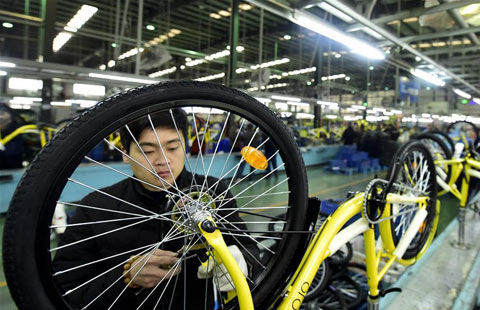Chinese money -not a big, bad wolf
 |
|
A cyclist passes by a plot of land where a home costing more than A$1 million ($768,900) was to be built, in the new Sydney suburb of Greenhills Beach, on May 13, 2014. JASON REED / REUTERS |
Australia's politicians, economists and analysts agree foreign investment, including from China, in real estate is key to economic growth
Sydney - Foreign investment in real estate has long been a politically and financially contentious issue in Australia-despite bipartisan political support for foreign investment from both sides of the party divide to allow overseas investment in property.
Analysts say that in the face of popularly widespread doubts to the contrary, it plays a positive dynamic role and is key to the workings of the local real estate market and the wider economy.
But they add that erroneous misconceptions remain as to the actual impact that foreign-and in particular Chinese investment-has Down Under.
Despite substantive evidence to the contrary, such as the findings of an Australian Treasury report issued late last year, a stubborn perception persists among many Australians-with many keen to point the finger at Chinese and other foreign nationals for the explosive price growth in recent years in the major Sydney and Melbourne housing markets.
While the blame game over price rises has taken place, at the same time Chinese nationals have been courted by Australian policymakers as a way to boost Australia's housing stock-with the same Treasury department report clearly stressing "foreign investment is being channelled into increasing the property supply as intended," with Chinese demand singled out as being critical.
One analyst said that with the positives of foreign investment on clear display, it was of paramount importance that the public was better educated as to not only the benefits of wide scale foreign investment in the real estate sector, but also the other factors at play that were causing Australia's current housing supply and affordability crisis.
David Rodgers, senior lecturer in architecture, design and planning at the University of Sydney, told Xinhua that the impact of Chinese investment on real estate was minimal and too much emphasis was being placed on looking for "easy answers to complex problems" in the real estate market.
"I think an easy answer people have come up with about the housing affordability problem is to say, well, it's all the Chinese capital," Rodgers said.
"The housing affordability problem is a very complex problem and the ways that you might address it can be quite confronting to people," he added.
Reports in The Australian newspaper on Jan 30 suggested that billions of dollars in "dodgy" Chinese investment money was making its way to Australian shores-and reported that government agency Austrac investigated A$1 billion ($769 million) of "suspicious" transactions involving real estate investments from China.
The story drove a narrative about a perceived threat to Australian housing affordability from China, yet admitted: "These so-called 'suspicious matter reports' are not definitive evidence of wrongdoing, but rather indications wrongdoing may have occurred."
Analysts say stories such as these added fuel to the fears regarding foreign investment that were held by the public. But the incidents comprised a small amount of the value of total real estate, in either new dwellings, which foreign investors can actually buy, or established dwellings, which they are barred from investing in.
Foreign direct investment in Australia is never going to be infallible, analysts pointed out. They said there will always be instances where regulatory guidelines are not correctly followed, or instances where the Foreign Investment Review Board is required to step in with a determination that approval for an investment or purchase should be denied.
The Australian head of one of the biggest real estate websites in China said that over 2,000 investigations had been done into real estate investments, with a finding of wrongdoing in a mere 61 sales, said Juwai.com's Gavin Norris.
He said that small figure, when seen against the total investment of foreign capital in Australia's real estate, was an even more insignificant number.
"It's a quite minuscule problem, I think."
The deputy director of the Australia China Relations Institute told Xinhua that not enough stories were being shared about the benefits of foreign investment, with Chinese companies such as Greenland and Dalian Wanda building new residential developments across the country and employing Australians.
"These companies employ thousands of Australian workers putting up these apartments. These aren't Chinese workers putting up these apartments. They have jobs that they wouldn't have had without this kind of investment," James Laurenceson said.
"And think of all the Australian families who now have a place to live, because these apartments were built thanks to foreign investment."























